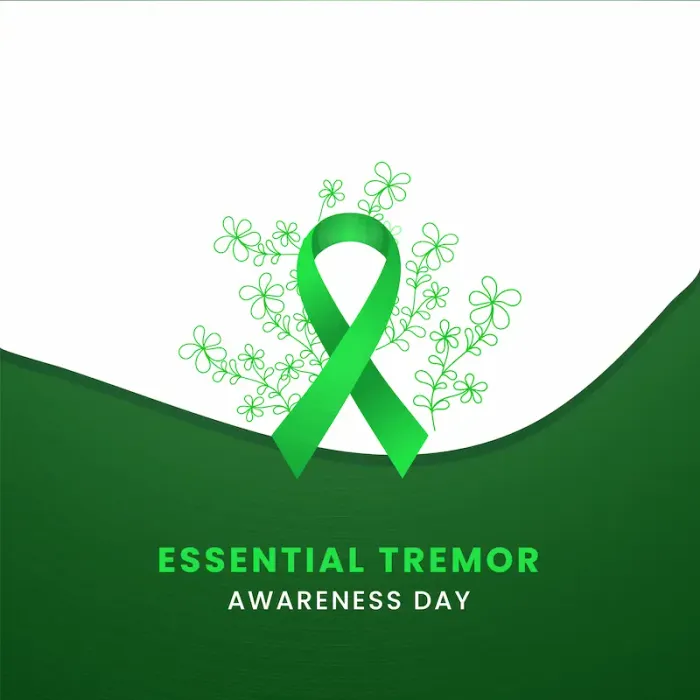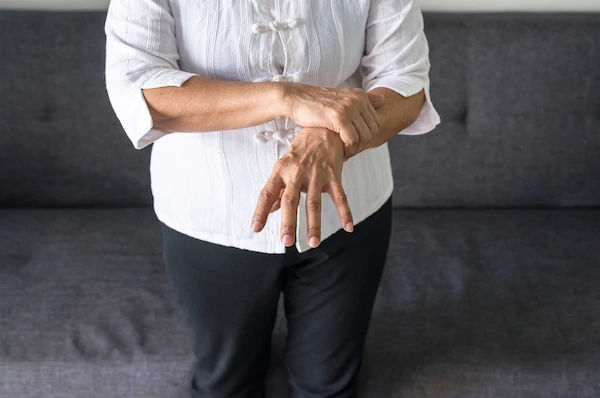Managing Tremors: A Complete Guide
Discover the causes and types of tremors, along with effective management strategies to improve daily life and maintain better control.

Written by Dr. Shaik Abdul Kalam
Reviewed by Dr. D Bhanu Prakash MBBS, AFIH, Advanced certificate in critical care medicine, Fellowship in critical care medicine
Last updated on 13th Jan, 2026

Introduction
Noticing a persistent shake in your hands, voice, or another part of your body can be a startling and anxiety-inducing experience. That unwelcome quiver, known as a tremor, is more common than you might think, affecting millions of people. While often associated with neurological conditions like Parkinson's disease, the reality is that most tremors are not a sign of a serious degenerative disorder. The immediate question is, what to do when you have tremor? This guide is designed to be your first resource. We'll walk you through the crucial first steps, help you understand the different types of tremors, explore immediate calming techniques and long-term lifestyle strategies, and clearly outline when it's time to seek professional medical advice. Our goal is to empower you with knowledge and practical tools to manage this symptom effectively.
First Steps: Don't Panic, Observe and Document
When you first notice a tremor, the most important thing is to stay calm. Anxiety can significantly worsen shaking, creating a vicious cycle. Instead of jumping to conclusions, shift into observation mode. Your initial task is to become a detective gathering clues about your own body.
Keep a "Tremor Diary": What to Track
Start a simple log to document your episodes. Note the date and time the tremor occurs. What were you doing? Had you just consumed coffee, a sugary snack, or were you feeling stressed? Record which body part is affected (e.g., right hand, left leg, head), the tremor's characteristics (fine shake vs. coarse wobble), and its severity on a simple scale of 1 to 10. This diary will be an invaluable tool for you and, if needed, for a doctor, to identify patterns and potential triggers.
Identifying Potential Triggers
Many tremors are exacerbated by specific factors. Common culprits include:
• Caffeine and other stimulants: A major trigger for enhanced physiological tremor.
• Stress and anxiety: The body's "fight or flight" response can induce shaking.
• Fatigue and lack of sleep: Exhaustion reduces muscle control.
• Low blood sugar: Skipping meals can lead to shakiness.
• Certain medications: Some asthma drugs, antidepressants, and mood stabilisers list tremor as a side effect.
Consult a Neurologist for the best advice
Understanding the Different Types of Tremor
Not all shakes are created equal. Understanding the basic categories can provide context, though a formal diagnosis is always necessary.
Essential Tremor: The Most Common Type
Essential tremor (ET) is the most prevalent movement disorder. It's often hereditary and characterised by a rhythmic shaking that typically occurs during voluntary movement, like holding a cup (kinetic tremor) or keeping arms outstretched (postural tremor). It most commonly affects the hands, head, and voice. It does not usually involve other neurological symptoms and often improves with a small amount of alcohol (though this is not a recommended treatment).
Parkinsonian Tremor: The "Resting" Shake
The classic tremor of Parkinson's disease is a "resting tremor," meaning it's most prominent when the muscle is relaxed and diminishes during voluntary movement. It often starts as a "pill-rolling" tremor in the hand. Crucially, it is usually accompanied by other symptoms like bradykinesia (slowness of movement), rigidity, and postural instability.
Physiological vs. Pathological Tremors
A key distinction is between an enhanced physiological tremor, a normal tremor that is simply more visible due to triggers like those listed above and a pathological tremor, which is caused by an underlying neurological condition like ET or Parkinson's. The intensity and impact on daily life are the main differentiators.
Immediate Techniques to Reduce Tremors in the Moment
When you need steady hands for a task and feel the tremor coming on, these techniques can help you regain control.
Deep Breathing and Grounding Exercises
Anxiety is fuel for tremor. Activating the body's relaxation response through diaphragmatic breathing can counteract this. Try the 4-7-8 technique: inhale quietly through your nose for 4 seconds, hold your breath for 7 seconds, and exhale forcefully through your mouth for 8 seconds. Repeat 3-4 times. Combine this with a grounding exercise: name 5 things you can see, 4 you can feel, 3 you can hear, 2 you can smell, and 1 you can taste. This pulls focus away from the tremor.
Muscle Relaxation and Postural Adjustments
Tremors can be amplified by tense muscles. Consciously drop your shoulders away from your ears. If your hand is shaking, gently press your fingers and palm flat against a solid surface like a table for a few seconds. This provides sensory feedback and can interrupt the shaking cycle. For a postural tremor, try sitting down and stabilizing your core muscles, which can reduce shaking in the limbs.
Lifestyle Modifications for Long-Term Tremor Management
Managing tremor is often a marathon, not a sprint. Consistent healthy habits can build a foundation for better control.
Dietary Changes: Caffeine, Sugar, and Stimulants
This is the lowest-hanging fruit. For many, eliminating or drastically reducing caffeine (coffee, tea, energy drinks, chocolate) can lead to a marked improvement. Similarly, avoid large spikes in blood sugar by eating balanced meals with protein, complex carbs, and healthy fats. Stay hydrated, as dehydration can also contribute to shakiness.
The Role of Sleep and Stress Reduction
Prioritising 7-8 hours of quality sleep is non-negotiable for neurological health. Incorporate daily stress-reduction practices like a 10-minute meditation, a walk in nature, or gentle yoga. Studies have shown that regular mindfulness practice can reduce the amplitude of essential tremors over time by lowering the body's overall stress response.
The Impact of Exercise and Physical Therapy
Regular, moderate exercise improves muscle strength, coordination, and overall well-being. Focus on activities like swimming, walking, or cycling. Occupational therapy is particularly beneficial; a therapist can teach you adaptive techniques and recommend weighted utensils or steadying devices that make daily tasks like eating and writing much easier.
When to Seriously Consider Seeing a Doctor
While many tremors are benign, certain signs warrant prompt medical evaluation. If your tremor is sudden in onset, rapidly worsening, or severely impacting your ability to work or perform daily activities, it's time to consult a professional.
Red Flag Symptoms That Require Prompt Attention
Seek medical advice if your tremor is accompanied by any of the following:
• Other neurological symptoms like changes in memory, speech, or gait.
• Muscle stiffness or slow movement.
• A change in mental state or headache (could indicate a thyroid issue or other metabolic cause).
• The tremor only occurs at rest and disappears with movement.
What to Expect During a Neurological Exam
A doctor, often a neurologist, will conduct a thorough exam. They will observe the tremor, test your reflexes, check your muscle tone and strength, and assess your coordination and gait. They will review your tremor diary and medical history. In some cases, they may order blood tests to rule out thyroid problems, vitamin deficiencies, or metabolic causes. Apollo24|7 offers convenient home collection for tests like thyroid panels or vitamin B12 levels, making the diagnostic process smoother.
Get Your Health Assessed
Medical Treatments and Therapeutic Options
If lifestyle changes aren't sufficient, a range of effective medical treatments are available.
Medications Commonly Prescribed for Tremor Control
The first line of defense is often medication. Beta-blockers like propranolol are commonly used to treat essential tremor by blocking nerve impulses that cause shaking. Anti-seizure medications like primidone can also be very effective. For Parkinsonian tremor, medications that increase dopamine in the brain (e.g., Levodopa) are the standard.
Advanced Interventions: Botox and Deep Brain Stimulation
For tremors that don't respond to medication, more advanced options exist. Botulinum toxin (Botox) injections can be highly effective for isolated tremors, like in the hands or voice, by weakening the overactive muscles. For severe, disabling essential tremor or Parkinson's tremor, Deep Brain Stimulation (DBS) is a surgical option where electrodes are implanted in the brain to deliver electrical impulses that block the signals causing tremor.
Conclusion
Discovering you have a tremor can be unsettling, but it's important to remember that you are not powerless. The journey of managing tremor starts with knowledge and observation; understanding your triggers is half the battle. From simple, immediate techniques like deep breathing to profound long-term lifestyle changes and advanced medical treatments, a wide spectrum of strategies exists to help you regain control and confidence. While this guide provides a robust starting point, it is not a substitute for professional medical advice. If symptoms persist beyond two weeks or interfere with your daily life, consult a doctor online with Apollo24|7 for further evaluation and a personalised management plan. You can live a full, active life with a tremor by being proactive and leveraging the right resources and support.
Consult a Neurologist for the best advice
Consult a Neurologist for the best advice

Dr Debnath Dwaipayan
Neurosurgeon
9 Years • MBBS, MS(Gen. Surgery), DrNB (Neurosurgery)
Delhi
Apollo Hospitals Indraprastha, Delhi

Dr. Ganeshgouda Majigoudra
Neurologist
10 Years • MBBS, MD ( GENERAL MEDICINE) DM (NEUROLOGY)
Bengaluru
Apollo Clinic, JP nagar, Bengaluru

Dr S Selvin
Neurologist
10 Years • MBBS, MD, DM (Neurology), FINR fellowhsip in Interventional Neuro Radiology
Chennai
Apollo Speciality Hospitals Vanagaram, Chennai

Dr. Aditendraditya Singh Bhati
Neurosurgeon
21 Years • MBBS(2004), DNB Neurosurgery(2014); MNAMS; Fellow Skull Base Endoscopy (Italy), Fellow Extended Skull Base ( Weill Cornell, USA), Fellow ZAP-X Radiosurgery. Member of American Association of Neurological Surgeons
Delhi
Apollo Hospitals Indraprastha, Delhi
(100+ Patients)

Dr. E Prabhakar Sastry
General Physician/ Internal Medicine Specialist
40 Years • MD(Internal Medicine)
Manikonda Jagir
Apollo Clinic, Manikonda, Manikonda Jagir
(150+ Patients)
Consult a Neurologist for the best advice

Dr Debnath Dwaipayan
Neurosurgeon
9 Years • MBBS, MS(Gen. Surgery), DrNB (Neurosurgery)
Delhi
Apollo Hospitals Indraprastha, Delhi

Dr. Ganeshgouda Majigoudra
Neurologist
10 Years • MBBS, MD ( GENERAL MEDICINE) DM (NEUROLOGY)
Bengaluru
Apollo Clinic, JP nagar, Bengaluru

Dr S Selvin
Neurologist
10 Years • MBBS, MD, DM (Neurology), FINR fellowhsip in Interventional Neuro Radiology
Chennai
Apollo Speciality Hospitals Vanagaram, Chennai

Dr. Aditendraditya Singh Bhati
Neurosurgeon
21 Years • MBBS(2004), DNB Neurosurgery(2014); MNAMS; Fellow Skull Base Endoscopy (Italy), Fellow Extended Skull Base ( Weill Cornell, USA), Fellow ZAP-X Radiosurgery. Member of American Association of Neurological Surgeons
Delhi
Apollo Hospitals Indraprastha, Delhi
(100+ Patients)

Dr. E Prabhakar Sastry
General Physician/ Internal Medicine Specialist
40 Years • MD(Internal Medicine)
Manikonda Jagir
Apollo Clinic, Manikonda, Manikonda Jagir
(150+ Patients)
More articles from Tremor
Frequently Asked Questions
1. What is the difference between essential tremor and Parkinson's tremor?
The key difference is when the tremor occurs. Essential tremor is an 'action tremor,' most noticeable during movement like holding a cup. Parkinson's tremor is a 'resting tremor,' most prominent when the limb is relaxed and supported against gravity. Parkinson's is also accompanied by other symptoms like slowness and stiffness.
2. Can vitamin deficiency cause hand tremors?
Yes, deficiencies in certain vitamins, particularly B12, magnesium, and thiamine, can lead to neurological symptoms including tremors and peripheral neuropathy. This is one reason a doctor might order blood tests.
3. Are there any natural remedies for essential tremor?
While not cures, some people find certain supplements like omega-3 fatty acids, passionflower, or skullcap helpful for managing mild symptoms, primarily through their anti-anxiety effects. However, you should always discuss any supplements with your doctor to avoid interactions with medications.
4. Can anxiety cause tremors all the time?
Anxiety can cause temporary tremors during heightened stress (acute anxiety). However, if you have a persistent, constant tremor, it's less likely to be solely caused by anxiety and more likely to be an enhanced physiological tremor or a condition like ET that is worsened by anxiety. A doctor can help differentiate.
5. Should I avoid exercise if I have a tremor?
No, in fact, the opposite is true. Regular, moderate exercise is highly beneficial. It improves muscle control, reduces stress, and promotes overall health. Focus on low-impact activities like walking, swimming, or yoga if balance is a concern.



.webp)
.webp)